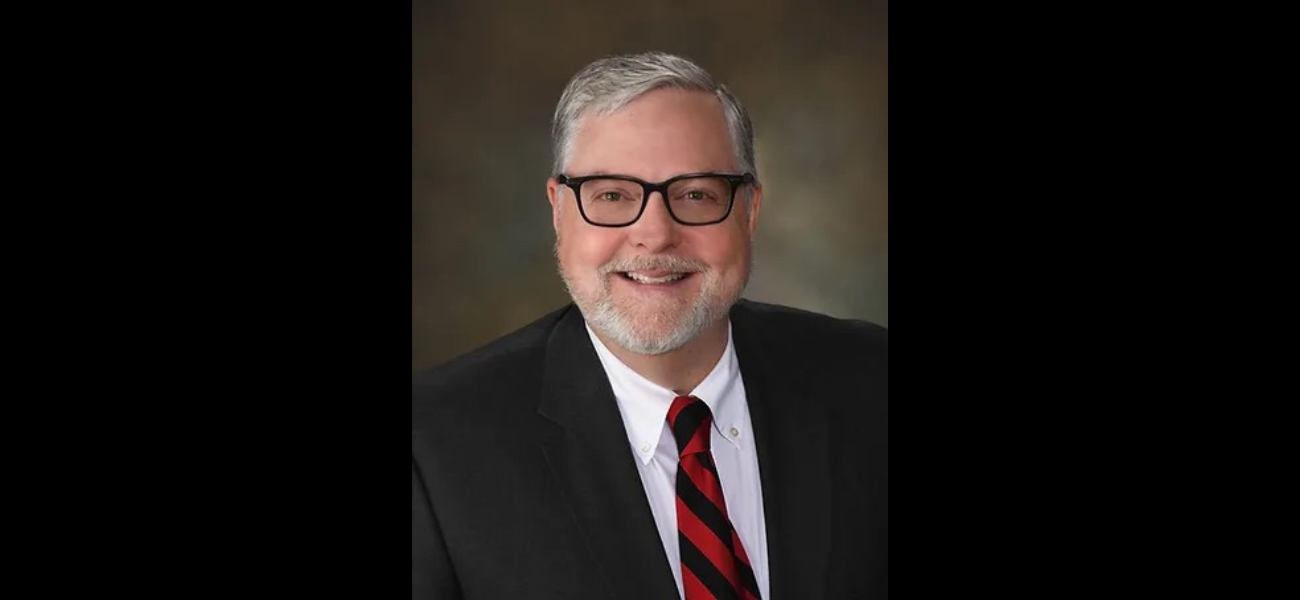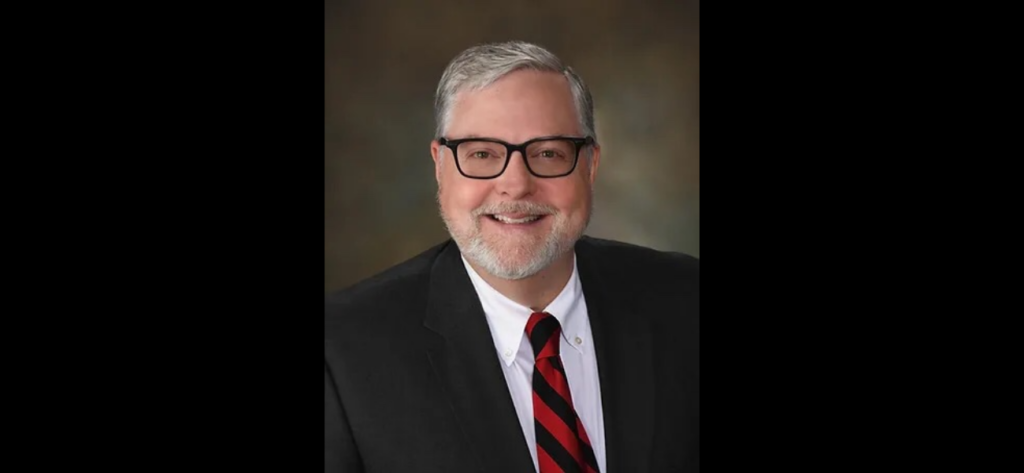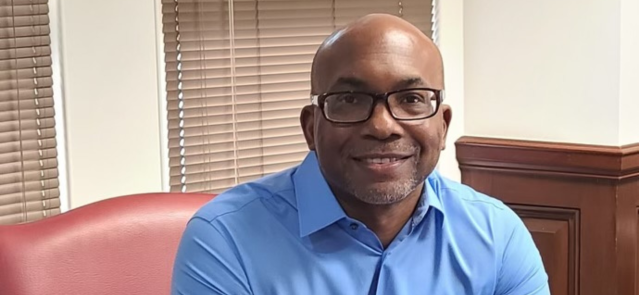Stay ahead of the curve as a political insider with deep policy analysis, daily briefings and policy-shaping tools.
Request a DemoAmericus Mayor Lee Kinnamon on Jimmy Carter: ‘… a giant man, who never lost his connection to this little place’

Mayor of Americus Lee Kinnamon
Lee Kinnamon, the 59-year-old mayor of Americus and a sixth-generation resident of Sumter County, sat down with State Affairs this week to discuss former President Jimmy Carter’s impact on Americus, a small, rural town in southwest-central Georgia with a population just shy of 16,000, Carter’s hometown of Plains, and the former president’s wider contributions to the county and state.
Americus, just 10 miles north of Plains, is the birthplace and headquarters of Habitat for Humanity, the nonprofit that works with volunteers and would-be homeowners to build affordable homes around the world. Jimmy and Rosalynn Carter spent one week a year for almost 40 years swinging hammers for Habitat, building and repairing thousands of homes, and bringing precious publicity to a cause near and dear to their hearts.
The conversation has been edited for brevity and clarity.
Q. What are some of the key ways that President Carter has been able to impact Americus, Plains and Sumter County throughout his life?
A. Well, since he returned to Sumter County from the White House he has been an unflagging supporter of his hometown’s and the county’s economic development, and a supporter of public education in the county. He’s a strong supporter of Georgia Southwestern [University], where he got to know his wife, Mrs. Rosalynn. And he has supported projects in Americus, such as the Rylander Theater. Of course, his and Rosalynn’s support for Habitat for Humanity, which was founded here by Millard and Linda Fuller, has been enormous. And they were all friends. Not only did they work together on these homebuilding projects around the country and around the world, but they were good friends. And so he was closely tied to what was going on here in the years following his presidency.
Q. Talk about that a little bit more, because most people know that he and Rosalynn volunteered with Habitat for Humanity. And because of their prominence, they brought a lot more attention to it. But how did that involvement begin and evolve?
A. President Carter grew up here [in Sumter County] on what was a fairly typical farm and, if you’ve read his book, “An Hour Before Daylight,” you get a glimpse into that world where African-Americans who worked [as sharecroppers] on the farm, and he and his father’s and mother’s siblings, they all were integrated in a way on the farm that allowed them to work with each other. They were segregated, of course, and separated by the conventions and rules of that period. And that informed his development significantly.
So that by the time he became our governor, and gave that famous quotation from the gubernatorial inaugural address in January of 1971, he had traveled a good way along an arc that began in his childhood. [At his inauguration, Carter said, “I say to you quite frankly that the time for racial discrimination is over. … No poor, rural, weak or Black person should ever have to bear the additional burden of being deprived of the opportunity of an education, a job or simple justice.”]
He was talking about an end to segregation and end to discrimination and a call for equality. It’s a watershed moment in the state’s history. Prior to that, we had not heard a governor say those words. And we had not heard him say those words. And I think that’s the moment that history will remember. Because Jimmy Carter had been elected under the assumption that he would be a sort of business-as-usual, conservative white governor, in the vein of Lester Maddox. [Segregationist former Georgia Governor] Marvin Griffin had endorsed him [Carter]. When he made that statement, he shocked some, but confirmed for others what they had long suspected: that he was really a progressive. And people who knew him well knew that he was going to change the state forever. And from that moment forward, he devoted really his entire life to living out those words.

Q. The evolution of his public positions on race is interesting. When he was on the school board in the 1950s, he basically toed the line as far as segregation goes.
A. Well, you know, I suppose the time was not right for that change to happen. But what allowed him to stand and make those statements at his inauguration were all of the heroic actions of African Americans and whites during the civil rights movement in the prior decades, in the ‘50s and the ‘60s. And it’s not as though he had not been evolving, really, from his childhood, and his intimate relationships with African-Americans on the farm. He had the example of Mrs. Lillian, his mother, who had a much more progressive, forward-thinking view on matters of race than certainly most people of her station here in those years.
Q. There was a period in the late-1950s when Carter was pressured to join the White Citizens Council in Plains. And he said he wouldn’t, and his peanut warehouse and dry goods store were boycotted.
A. President Carter is never one to be bullied. We also have to remember even when he was campaigning for governor, on the position of federally enforced busing, he stood against that and said that he did not believe that was the solution. And part of that was the fact that he just was not going to be bullied.
So now in terms of my personal experience with him —I was speaking as a historian, because I was born in 1964, the year of the Civil Rights Act. So you know, I turned seven in 1971. I don’t remember the assassination of Dr. King, right? But turning to what I do know of him [Carter] on a personal level, when he was campaigning for president, and when he ultimately won the election and went into the White House, I was 11, 12, 13 years old. Those are really strong memories for me.
Q. What do you remember?
A. Just the incredible flood of people into this sleepy place. Plains was transformed. And we would ride over there from Americus, my cousin and my sister and I. We would go over and gawk at all of the goings-on and kind of marvel that [ABC news reporter] Sam Donaldson would be at the depot in Plains, interviewing Mrs. Lillian. And yeah, I remember the pride, too, that we, me and my parents, felt of having a president from this place was overwhelming. I remember my grandmother having campaign buttons, and all the posters and paraphernalia and things for Carter. And she was very interested and very, very proud of that. Now, I’m talking about a woman who was born in 1894. She lived to be 97.
Much later in life, I got to know President Carter and Mrs. Rosalynn in a civic capacity. They were both involved in driving the economic development to ensure the continued good fortune of their hometown, Plains, which they dearly loved.
So in the late-‘90s, Mrs. Rosalynn and Mr. Jimmy, in order to accomplish this, one thing that they thought would help would be to take the railroad line that runs into their town and create a passenger excursion train for tourists. And they became involved in that, and I was named to the board of the Southwest Georgia Railroad Excursion Authority, which was created by the Georgia General Assembly. President Carter had his hand in, kind of pushing that forward to get it funded and to get it created. …President Carter worked very closely with [local legislators] to make sure it happened. And then I began to get to know President Carter and have interactions with him. … I was made chair and I’ve served ever since, for about 20 years, as the chairman of the railroad authority.
Q. And what does that railroad do for not just Plains, but for the whole area?
A. Millions of dollars in economic uplift every year for this relatively poor area. At least $2 million in direct economic impact from the train, and then of course a big multiplier effect from all the related tourism.
The train begins near Cordele, where we’re headquartered, and then it takes passengers from there across the heart of Sumter County, crossing Lake Blackshear and the Flint River. Then it terminates at Archery, which is [Carter’s] boyhood farm. And we bring thousands of people annually. Several hundred on each trip come into Plains every Saturday. And we’ve all benefited. Because when it lays over here in Americus, we have people staying in our hotels and our restaurants. … And our business owners know the excursion train is deeply tied to their fortunes.
And I have to give President Carter and Mrs. Rosalynn their due for this. They were just absolutely determined to get that train off the ground. It took a lot of people, but without the clout offered by the Carters, we probably wouldn’t be here today talking about it.
And the Carters have stuck with it. We lost all state funding for the train during the great recession. And we were cut completely out of the state budget. And just in the last several years, President Carter has helped to advocate for restoring funding to the train, helping us to navigate politics and the budget process and all of that with people he knows, and it has been bipartisan. [Representative] Butch Parrish, a Republican, really helped with that. It has not been, you know, ‘Well, that train was for President Carter and his Democrat cronies.’ It’s a train that helps a poor part of the state just get a little bit better. It helps a lot of folks, it provides employment, it’s an economic engine.
Q. What is the budget for the train?
A. It’s just shy of $700,000. And you know, sometimes [Carter] would ask me hard questions about what we’re doing and what the numbers are looking like. Because when I would meet with him, he’s the chief executive, in every sense of the word, and he would ask all the difficult questions.
… And not all people who leave that [presidential] office are as connected and invested and rooted in their home place as President Carter is. He has just done so much to improve conditions here.
Q. Carter devoted a lot of acreage from a former peanut and soybean tract on his farm to create a giant solar energy field that now powers 50% of Plains. And now we have all of these green energy industries, including solar energy companies, coming to Georgia.
A. Well, he was the alternative energy president. He was the one who pioneered that, making the White House energy efficient and so forth. He was way ahead of his time on that, though, and he was criticized for it at the time. The Austerity President, right? And there was a big economic development announcement in the governor’s office recently about a solar panel company coming to Americus. NanoPV is the name of the company… We hope that materializes. If it does it could be an enormous economic uplift.
Q. We understand that over these last couple of years, the Carters are still working on a fair housing initiative through the Carter Plains Foundation to delve into some heirs property issues with a number of low-income, predominantly African American folks in Plains who don’t have clear titles to their homes, which are falling into disrepair. And they’re helping to repair the homes and work out the legal issues.
A. Yes, those properties are all wrapped up in inheritance issues, with lack of wills and deeds and so forth. So yes, it’s heirs properties, we call it. That’s exactly right.
…They are amazing. It has been a privilege for me to get to know them. My wife Karen and I have had dinner [at a mutual friend’s home] with the Carters and other people on many occasions. This is kind of a closing of an era for us. We used to go over there fairly frequently and talk with him. About personal things, not just train business. I mean, he likes to hunt and fish and do things that I like to do. He’s a big outdoorsman. He’s a fly fisherman. He was a deer hunter. He loves turkey hunting. So he’s, you know, just like a lot of other folks around here, I guess. … But he also happens to be a former president.
Q. President Carter has said what drew him back to Plains is the kind of peace and equilibrium he gets from being there, still connected to his people, and to be in the natural environment, the woods and the streams.
A. For President Carter, place matters. I know that place doesn’t matter to people so much anymore. In our transient society, people rarely stay in one place long enough to develop connections and roots and all that, but for him, he grew up as did I, and here place matters to us. His people, my family, we’re both from families that go back generations here. My boys, our children, are seventh-generation residents of Sumter County, which is unusual today.
… He’s just a real person who has a very broad understanding of history and politics, and religion, and is conversant on so many topics. But he’s also a down-to-earth human being. So one minute we can be talking about, you know, the political history of the New Deal, or something like that, and the next minute you’re able to talk with him about his pond and fishing and a fly that he used, and that sort of thing. So you can do both with President Carter, he’s never lost. Connection and rootedness with this place and its people matter to him. And I think the things that he grew up doing as a child, you know, fishing, for example, was something he loved to do when he was little. And he carried that with him.
I dare say if he were able to, he would probably want to go fishing this week because the weather’s about to warm up. We’re about to hit 84 degrees on Thursday. And he’s probably thinking that turkey season is about to start in March. He so loves turkey hunting. So in other words, a giant man of the world, who has never lost connection to this little place.
Do you have memories of former President Jimmy Carter or his family? We would love to hear from you. Reach out on social media at:
Twitter @StateAffairsGA
Instagram @stateaffairsGA
Facebook @stateaffairsUS
LinkedIn @stateaffairs
Read more on President Carter:
Jimmy Carter: From Plains to prominence
COMMENTARY: He is ‘Mr. Jimmy’ to me
COMMENTARY: What Jimmy Carter taught me about being a public servant and reading a compass
Chick-fil-A board chairman Dan Cathy reflects on Jimmy Carter’s ‘profound’ legacy
Newly minted Senate Minority Leader Harold Jones II: ‘I’m not the typical back-slapping politician’
Nearly 10 years into legislative life, Sen. Harold Jones II wouldn’t change anything about the experience. “I love every minute of it. Even when I hate it, I love it,” the 55-year-old Augusta Democrat told State Affairs. Come January, Jones will add another role to his legislative duties: Senate minority leader, a job held for …
Gov. Kemp calls on state agencies to be fiscally restrained amid record $16.5B surplus
The Gist Gov. Brian Kemp asked the state’s 51 government agencies for continued fiscal restraint when drafting their amended fiscal year 2025 and 2026 budgets. Most agencies adhered to his request even as the state’s general fund surplus hit a record $16.5 billion last month. Forty-five agencies, excluding state courts, followed the governor’s instructions to …
Georgia defies bomb threats as election chief declares a “free, fair and fast” vote amid record turnout
ATLANTA – Despite dealing with over 60 bomb threats, Georgia’s election chief said Tuesday the state’s general election went smoothly. Georgia had a record turnout with nearly 5.3 million people voting, Secretary of State Brad Raffensperger told reporters. Election officials in the state’s 159 counties have until 5 p.m. to certify votes. “We had a …
In the (state)house: Meet the newest members of the Georgia legislature
When lawmakers reconvene at the state Capitol on Jan. 13, there’ll be a cadre of new faces in the 236-member Georgia General Assembly, one of the nation’s largest state legislatures. All 236 statehouse seats were up for election this year. Most candidates ran unopposed. Incumbents in contested races easily kept their seats, with the exception …




